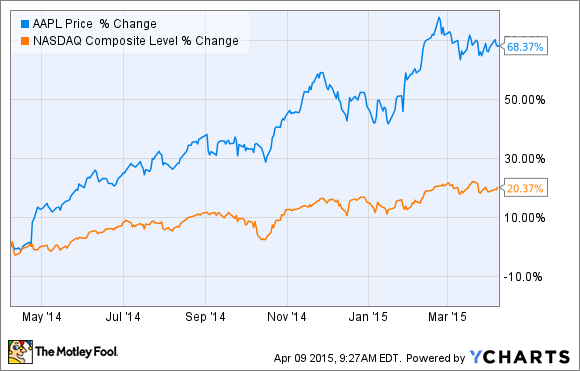At a time when it's been great to be a tech investor in general, it's been an especially ebullient last 12 months for shareholders of tech giant Apple (AAPL -2.41%).
Apple 1 Year Stock Chart, data by YCharts
Powered by a compelling mix of undervaluation and its strongest product portfolio in years, Apple shares have spiked, prompting discussion that the company could reach a $1 trillion market capitalization, perhaps sooner than many realize. However, even with Apple stock having risen so much of late, one analyst recently made a compelling case that Apple shares remain undervalued, even at roughly $125 per share.
5 Reasons Apple Remains Undervalued at $125
Recently, Citi analyst Jim Suva issued a research report outlining five specific reasons he believes Apple stock is poised to continue to rise in the coming months. Let's quickly review each argument.
- Valuation and consensus -- This one's pretty straightforward. Despite its massive size and recent rally, Apple remains observably undervalued. By his math, Suva reckons Apple currently trades at just 14 times its next 12-month's earnings or 11 times forward EPS after backing out the $25 in cash per share Apple currently carries on its balance sheet. Considering that the S&P 500 trades for 17 times forward earnings, Apple shares seem downright cheap -- especially when factoring in the many other growth drivers we'll discuss throughout the rest of this piece.
- Gross margins trending up -- Suva believes that thanks to the recent proliferation of "content rich apps and generational camera hardware upgrades", Apple has stacked the deck to push consumers toward purchasing larger storage capacity iPhones. Especially with Apple killing the 32 GB version iPhone with the iPhone 6 and iPhone 6 Plus. And since the additional $100 increments Apple charges for larger-memory devices is almost entirely profit for Apple, it stands to reason the tech giant should enjoy some margin expansion during fiscal year 2015.
- Apple Pay and Passbook -- Reports suggest Apple Pay has already proven a success, even as the service remains limited to Apple's latest generation of devices. However, as the installed base expands in the quarters ahead and Apple adds international support for the service, Suva believes that Apple Pay and Passbook both represent significant growth opportunities for Apple, and I tend to agree.
- Enterprise -- Recently, Apple and IBM unveiled their latest round of impressive enterprise focused apps, and many believe Apple still has a massive opportunity in the enterprise. By teaming with IBM, Apple enjoys a partner who understands enterprise customers' software needs and has a massive sales team already on the ground to help push its iDevices further into the business community.
- Device acceleration -- Finally, Suva believes the widespread trend of cellular carriers allowing early upgrades will increasingly help "pull forward" demand for Apple's devices. This isn't necessarily a new phenomenon in established markets like the U.S., but Apple has taken some potentially significant moves in this vein of late, like its recently launched device trade-in program in China.
All told, these certainly make for some compelling reasons to buy Apple stock. However, I maintain that Suva overlooks several of the most substantial coming growth drivers for Apple stock as well.
As if you needed another reason
Just off the top of my head, I can think of a number of additional catalysts Suva's analysis overlooks. For starters, there's the matter of the Apple Watch, Apple's first new product category since 2010. True, its first-year sales probably won't move the needle too much for Apple. However, given Apple's massive installed user base and brand loyalty, the Apple Watch should create another 10-figure revenue source as long as Apple continues to improve the product.
Beyond Apple Watch, Apple is also widely expected to introduce a new music streaming service as well as an over-the-top TV content service later this year. Both services share the twin virtue of creating new revenue streams of their own, while also helping to bolster the appeal of Apple's overall ecosystem. There's also Apple's capital return program, which is due for an update soon.
Beyond these more well-established product storylines, there are also the more far-flung possible growth drivers Apple enjoys, like its recently surfaced Project Titan (a.k.a. the Apple Car). However, even if you leave such longer-term financial catalysts out of the picture, hopefully it's abundantly clear by now that there are plenty of ways in which Apple can continue to produce compelling returns for shareholders.






